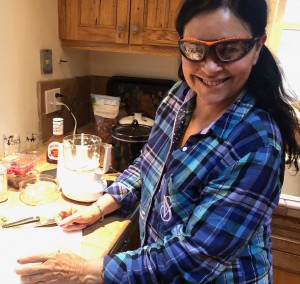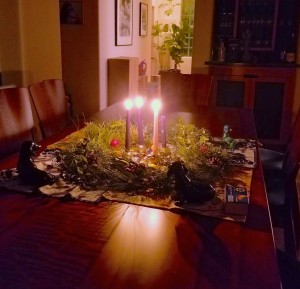 Today is the Third Sunday of Advent, called “Gaudete” (“Rejoicing”) Sunday. This is where we pause in our solemn reflections, light the third candle of our Advent wreath (which is pink) and realize with joy and wonder what this process is leading to: the fulfillment of hope and promise in the greatness of love.
Today is the Third Sunday of Advent, called “Gaudete” (“Rejoicing”) Sunday. This is where we pause in our solemn reflections, light the third candle of our Advent wreath (which is pink) and realize with joy and wonder what this process is leading to: the fulfillment of hope and promise in the greatness of love.
I did wonder just how Roger proposed to follow Captain Cunningham’s act. The congregation had scattered under the trees to take refreshment, but every group I passed was discussing what the Captain had said, with great excitement and absorption—as well they might. The spell of his story remained with me—a sense of wonder and hope.
Bree seemed to be wondering, too; I saw her with Roger, in the shade of a big chinkapin oak, in close discussion. He shook his head, though, smiled, and tugged her cap straight. She’d dressed her part, as a modest minister’s wife, and smoothed her skirt and bodice.
”Two months, and she’ll be comin’ to kirk in buckskins,” Jamie said, following the direction of my gaze.
“What odds?” I inquired.
“Three to one. Ye want to wager, Sassenach?”
“Gambling on Sunday? You’re going straight to hell, Jamie Fraser.”
”I dinna mind. Ye’ll be there afore me. Askin’ me the odds, forbye… Besides, going to church three times in one day must at least get ye a few years off Purgatory.”
I nodded.
“Ready for Round Two?”
Roger kissed Brianna, and strode out of the shade into the sunlit day, tall, dark and handsome in his best black—well, his only black suit. He came toward us, Bree on his heels, and I saw several people in the nearby groups notice this, and begin to put away their bits of bread and cheese and beer, to retire behind bushes for a private moment, and to tidy up children who’d come undone.
I sketched a salute as Roger came up to us.
“Over the top?”
“Geronimo,” he replied briefly and with a visible squaring of the shoulders, turned to greet his flock and usher them inside.
Inside, it was noticeably warm, though not yet hot, thank God. The smell of new pine was softer now, cushioned by the rustle of homespun and the faint scents of cooking and farming and the messy business of raising children that rose in a pleasantly domestic fog.
Roger let them settle for a moment, but not long enough for conversations to break out. He walked in with Bree on his arm, left her on the front bench and turned to smile at the congregation.
“Is there anyone here who doesna ken me already?” he asked, and there was a slight ripple of laughter.
“Aye, well, the fact that ye do ken me and ye’re here anyway is reassuring. Sometimes it’s the things we know that mean a lot in part because we ken them well, and understand their strength. Will ye be upstanding then, and we’ll say the Lord’s Prayer together.”
They rose obligingly and followed him in the prayer—some, I noticed, speaking it in the Gaidhlig, though most in variously accented English.
When we all sat down again, he cleared his throat, hard, and I began to worry. I was sure that his voice was better than it had been, whether from natural healing, or from the treatments—if something so simple and yet so peculiar as Dr. MacEwan’s laying-on of hands could be dignified by the name—I’d been giving him once a month—but it had been a long time since he’d spoken at length in public, let alone preached—let alone sing, and the stress of expectation was a lot to deal with.
“Some of ye are from the Isles, I know—and from the North. So ye’ll ken what lined-singing is.”
…..[going through the Psalm]
More voices, a spreading confidence, and by the third phrase, we were sharing Roger’s happiness, moving into the words and their meaning.
It was a fairly short psalm, but they were having such a good time that he went through it twice, and stopped, finally, wringing with sweat and flushed with heat and effort, “Even life for evermore!” still ringing in the air.
“That was good,” he said, in a croak, and they laughed, though kindly. “Jamie—will ye come read to us from the Old Testament?”
I glanced at Jamie in surprise, but apparently he was ready for this, for he picked up his small green Bible, which he’d brought along with him, and came to the front of the room. He was wearing the best of his two kilts, with the only sober-looking coat he possessed, and taking his spectacles from the pocket, put them on and looked sternly over the tops of them at the boys in the back, who instantly ceased their whispering.
Evidently satisfied that the stern look would suffice, he opened the book and read from Genesis the story of the angels who visited Abraham, and in receipt of his hospitality, assured him that by the time they came again, his wife Sarah would have borne him a son, “…. Therefore Sarah laughed within herself, saying, After I am waxed old shall I have pleasure, my lord being old also?”
He glanced up briefly at that line, and his eyes met mine. He said, “Mphm,” in the back of his throat, looked down at the page and ended with…“Is any thing too hard for the Lord? At the time appointed, I will return unto thee, according to the time of life, and Sarah shall have a son.”
I heard a tiny snigger from somewhere behind me, but it was instantly drowned by the final verse: “Then Sarah denied, saying ‘I laughed not:’ for she was afraid. And he said, Nay but thou didst laugh.”
Jamie closed the book with neat decision, bowed to Roger and sat down beside me, folding away his spectacles.
“I dinna ken how people can think God doesna have a wicked sense o’ humor,” he whispered to me.
[Excerpt from GO TELL THE BEES THAT I AM GONE, Copyright ©2020 by Diana Gabaldon.]
https://www.youtube.com/watch?v=rDT-fZTJl3Q
Related Blog Entries:
The Second Sunday of Advent – 2020, posted on Sunday, December 13, 2020.
The First Sunday of Advent – 2020, posted on Sunday, November 29, 2020.
This blog entry also appeared on my official Facebook page on Sunday, December 13, 2020.


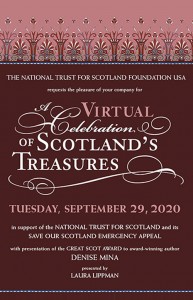
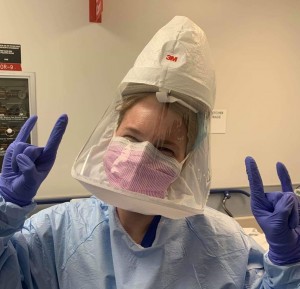
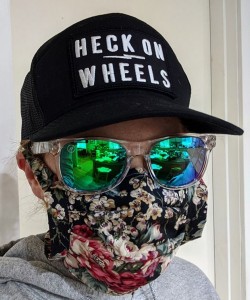
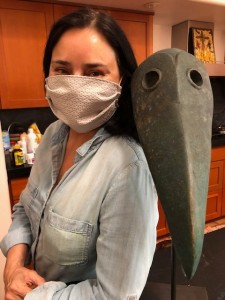



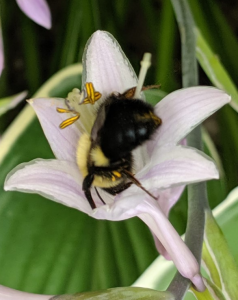
 At right, I am at home in my yard, working, in 2015.
At right, I am at home in my yard, working, in 2015.